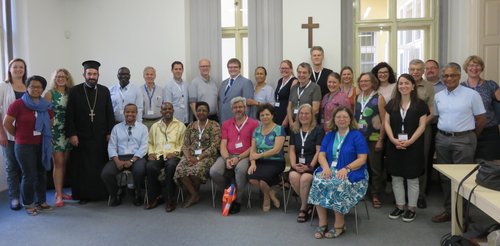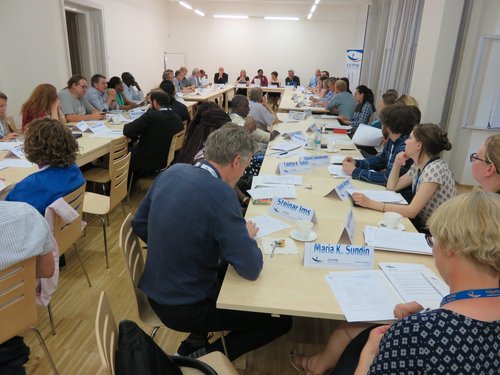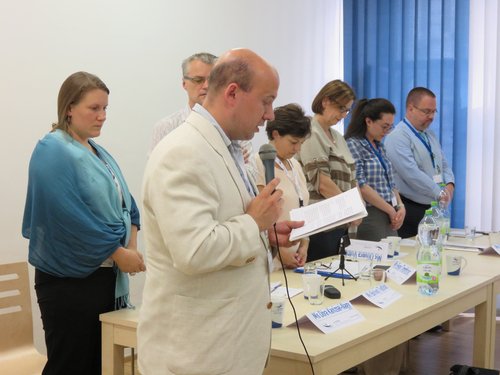No Longer Foreigners and Strangers
2017. június 29., csütörtökIn advance of it’s General Assembly, the Churches’ Commission for Migrants in Europe held a conference in Prague on June 23-24 which brought together more than 70 representatives, including a large delegation from Hungary. The conference of experts from across Europe confirmed churches’ role in creating an atmosphere of welcome and integrating migrants and refugees into society.
Prior to CCME’s 20th General Assembly, the organization gathered participants from across Europe for a conference on the churches’ role in the integration of refugees and migrants, based on Ephesians 2:19 which says that, “Consequently, you are no longer foreigners and strangers, but fellow citizens with God’s people and also members of his household.” The biblical imperative to welcome the stranger was at the heart of the event held in Prague from June 23-24, which brought together more than 70 representatives from CCME’s 18 member countries across Europe, such as Hungary, the Czech Republic, Slovakia, the United Kingdom, Armenia, Greece, Finland, Sweden, and more. In addition to church representatives, government’s and NGO’s of some of the above mentioned countries also sent participants.
Kalunba Social Services Nonprofit Ltd., the Implementing Partner of the RCH’s Unit for Refugee Integration, was represented by a large delegation at the conference. Dora Kanizsai-Nagy, the RCH Diaconal Office’s Head of the Unit for Refugee Integration and co-founder of Kalunba, participated in the conference as an expert on a panel related to integrating refugees in a difficult environment. In addition, eight staff and volunteers from Kalunba made the trip to Prague to take part in the conference and also support Kalunba’s CEO, Balázs Acsai, as the non-profit was officially recognized by CCME as a member organization during the first day of the General Assembly.

The opening session of the conference focused on integration and best practices from a Czech perspective, where Reverend Daniel Zenaty, Synodal Senior of the Evangelical Church of the Czech Brethren, said that the Czech Church tries, “to support all those who have an open heart and help those in need.” Ms Pavla Novotna, Deputy Director of the Section of Asylum and Migration Policy in the Ministry of Interior of the Czech Republic, discussed integration from the Czech perspective. She said that, “The complex integration policy is an integral part of asylum and migration policy in the Czech Republic,” and that, in her experience, one of the most important parts of the integration process is, “discussing expectation management as soon as possible,” even though sometimes it may be difficult.
The second session of the gathering related to the opportunities and challenges of migrants’ and refugees’ integration into their new countries. Thomas Huddleston of the Migration Policy Group based in Brussels presented insights into research and underlined that “Integration policies matter.” He said that, “Integration happens over time, it happens over generations, and integration as a process happens better when governments invest in social policy.” Others with a depth of experience on migrant and refugee issues from around Europe contributed to a panel on the opportunities and challenges for integration. Insights from Scotland, Romania, and Italy, as well as the European level, underscored different barriers to integration across Europe. Inputs highlighted the unique chances in community-based integration.

The last session of the day focused on integrating refugees in a difficult environment. Experts working in Central and Eastern Europe underlined churches’ role in integration among difficult political circumstances in their national contexts. In any case, sustainable integration needed welcoming societies as a precondition.
Ms Olivera Vukotic of the United Nations High Commissioner for Refugees Budapest office raised the issue of the difficult situations for the governments in Central Europe. She noted that the UNHCR sees that, “People have had different lives and have different needs. Integration is not something that we, you, or the government can do all on its own.” Dora Kanizsai-Nagy, the RCH Diaconal Office’s Head of the Unit for Refugee Integration, spoke about her work with Kalunba and told the group that, “Every year the face of our organization has had to change in order to respond to changes in the legal system and within the attitudes of the people in Hungary.”

The day ended with prayer led by Mgr. Petr Jan Vins, General Secretary of the Ecumenical Council of Churches in the Czech Republic. CCME Moderator Mrs Victoria Kamondji Johnston summed up the conference by saying that, “Migration is here to stay. True integration needs efforts from both newcomers and host societies. In spite of achievements so far, continued work is necessary.”
Article via CCME Press Release No: 17/24
Edited by Kearstin Bailey
Photos via CCME
Contact us
Click here if you are interested in twinning.
Reformed Church in Hungary
Address: H-1146 Budapest, Abonyi utca 21.
PO Box: 1140 Budapest 70, Pf. 5
Email: oikumene@reformatus.hu
English, German and Korean language services in Budapest
Links
Recommended articles
-
Pastoral Letter in the Light of the Pandemic
Bishop Dr. István Szabó sent a pastoral letter of encouragement to the ministers serving in RCH’s congregations, expressing his gratitude for the persistence and creativity of the pastors.
-
RCH Joins in Pope's Call for Prayer
RCH published the call on congregations to join the initiative of Pope Francis, supported by ecumenical organisations, to unite in praying the Lord’s Prayer on Wednesday, 25 March, at noon.
-
English Speaking Worship Services Online
Each Sunday at 11 AM (CET) the St. Columba's Church of Scotland in Budapest, the international community of RCH invites you to join the worpship service on its facebook page.
-
Test of Humanity and Companionship
Reformatus.hu asked Dr. György Velkey, Director General of the Bethesda Children’s Hospital of RCH about the challenges of health care workers and ways of prevention against the pandemic.
-
All Church Events Suspended
In light of the coronavirus the Presidium of RCH requested congregations to suspend all church events with immediate effect. Beside restrictions, it calls for prayer, sobriety and responsibility.











